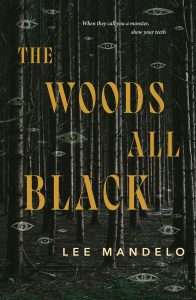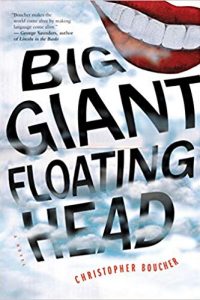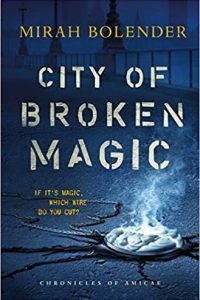Gary K. Wolfe Reviews The Woods All Black by Lee Mandelo
 The Woods All Black, Lee Mandelo (Tordotcom 978-1-250-79031-6, $19.99, 160pp, hc) March 2024.
The Woods All Black, Lee Mandelo (Tordotcom 978-1-250-79031-6, $19.99, 160pp, hc) March 2024.
Lee Mandelo focuses on the hazardous experiences of a trans man in 1929 rural Kentucky in The Woods All Black. Like Wasserstein, Mandelo opens with a classic narrative hook: a stranger arrives in a small town on a new assignment, and finds the townspeople chilly if not openly hostile, as though they are guarding some ominous secret. The stranger in this case is Leslie Bruin, a World War I veteran nurse now working for the Frontier Nursing Service, an actual organization founded to provide basic medical care to remote areas of Kentucky. Leslie is hardly an obvious fit for the village of Spar Creek; not only is he trans (although he keeps quiet when the locals all view him as an “army girl,” and even introduces himself as “Miss Leslie Bruin”), but he spent some time in Paris after the war, enjoying the more liberal sexual mores and developing a taste for Virginia Woolf and Oscar Wilde. Ironically, though, his most vocal enemy in Spar Creek knows none of this. The local pastor, Ames Holladay, simply views Leslie as a woman who is both educated and unmarried, which is all that’s needed to condemn Leslie in his fundamentalist worldview. This is hardly enough to explain the reticence of the other townspeople, though. A respected elderly woman tells Leslie that “there are strange currents running under Spar Creek,” and a teenager he meets at church warns him to “get out of here. Fast as you can.”
That teenager, Stevie Mattingly, is facing his own gender-identity issues, and has long been a target of Pastor Holladay. Facing a crisis of his own, he becomes a reluctant ally, and eventually more than that, but his main secret is saved until later in the story. Meanwhile, Leslie gets the local council to permit him to set up a series of immunizations, on the condition that as soon as they are done, he’ll leave town – despite knowing of a local woman facing a problematic pregnancy. Leslie’s own explorations seem to only lead to more mysteries, such as a hidden alcove in the woods decorated with drawings of black eyes and fragments of human fingers. Mandelo is downright prudent in gradually unfolding the mysteries of the forest, and while the eruption of the supernatural is clearly inevitable, it’s still a bit startling when it comes. By then, however, it’s already entwined with the themes of body image, transformation, self-determination, and identity that are what really make the novella compelling, along with its chilling (if not unfamiliar) view of provincial intolerance. While The Woods All Black harks back to a long tradition of remote rural horror stories, it also brings to that tradition a sharp awareness of what survival skills trans men and women must have needed a century ago – and still do – and it pointedly raises the question of who is really a monster, and to whom?
Gary K. Wolfe is Emeritus Professor of Humanities at Roosevelt University and a reviewer for Locus magazine since 1991. His reviews have been collected in Soundings (BSFA Award 2006; Hugo nominee), Bearings (Hugo nominee 2011), and Sightings (2011), and his Evaporating Genres: Essays on Fantastic Literature (Wesleyan) received the Locus Award in 2012. Earlier books include The Known and the Unknown: The Iconography of Science Fiction (Eaton Award, 1981), Harlan Ellison: The Edge of Forever (with Ellen Weil, 2002), and David Lindsay (1982). For the Library of America, he edited American Science Fiction: Nine Classic Novels of the 1950s in 2012, and a similar set for the 1960s. He has received the Pilgrim Award from the Science Fiction Research Association, the Distinguished Scholarship Award from the International Association for the Fantastic in the Arts, and a Special World Fantasy Award for criticism. His 24-lecture series How Great Science Fiction Works appeared from The Great Courses in 2016. He has received six Hugo nominations, two for his reviews collections and four for The Coode Street Podcast, which he has co-hosted with Jonathan Strahan for more than 300 episodes. He lives in Chicago.
This review and more like it in the February 2024 issue of Locus.
 While you are here, please take a moment to support Locus with a one-time or recurring donation. We rely on reader donations to keep the magazine and site going, and would like to keep the site paywall free, but WE NEED YOUR FINANCIAL SUPPORT to continue quality coverage of the science fiction and fantasy field.
While you are here, please take a moment to support Locus with a one-time or recurring donation. We rely on reader donations to keep the magazine and site going, and would like to keep the site paywall free, but WE NEED YOUR FINANCIAL SUPPORT to continue quality coverage of the science fiction and fantasy field.
©Locus Magazine. Copyrighted material may not be republished without permission of LSFF.








Hi Gary,
What is “Wallerstein” – who wrote it?
Thanks,
DANNY